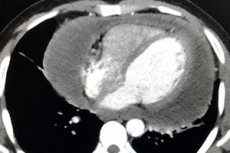Medical expert of the article
New publications
Pericardial thickening
Last reviewed: 29.06.2025

All iLive content is medically reviewed or fact checked to ensure as much factual accuracy as possible.
We have strict sourcing guidelines and only link to reputable media sites, academic research institutions and, whenever possible, medically peer reviewed studies. Note that the numbers in parentheses ([1], [2], etc.) are clickable links to these studies.
If you feel that any of our content is inaccurate, out-of-date, or otherwise questionable, please select it and press Ctrl + Enter.

Pericardial thickening refers to the process in which the layers of the pericardium become denser and thicker than normal. Pericardial thickening represents pericarditis - an inflammatory process in the pericardium. It is worth noting that the process is accompanied by a violation of blood circulation, nutrition of the heart muscle.
Pericardial thickening can occur against the background of general somatic diseases, after infectious (viral, bacterial) diseases. Often thickening occurs against the background of immunodeficiencies. As a result of thickening, the contraction of the heart muscle becomes more difficult, friction of the heart membranes occurs, the likelihood of wear and tear of cardiac tissue increases. At the same time, pathologic exudate may accumulate between the heart membranes.
It is often difficult to diagnose pericardial thickening. Quite often the pathology is asymptomatic. Numerous pathological processes and complications develop, which later become the cause of death of patients. Most often this disease occurs in elderly people. Thickening of the pericardium can also be observed in athletes who are intensively engaged in sports. In this case, we are talking about hypertrophy (overtraining) of the heart muscle, which increases its volume, size, thickness.
Pericardial thickening can be a sign of more severe heart disease, for example, it can be a sign of heart failure or a precursor to a heart attack. Sometimes pericardial thickening can occur as a result of trauma, and can also result from autoimmune aggression (e.g., in lupus, rheumatism). In this case, cardiac tissue is subjected to destruction by its own immune cells, which perceive it as a genetically foreign agent.
As a complication, cardiac tamponade may develop, in which severe compression of the heart muscle occurs. In the future, this may lead to impaired blood circulation and trophic processes. Thickening of the pericardium can lead to the development of infarction, necrosis of certain parts of the heart. There is a risk of developing heart failure.
Treatment is prescribed by a cardiologist. Treatment tactics depend on the form, stage of the disease, its features. In this case, drug treatment is possible. Aspirin, nonsteroidal anti-inflammatory drugs, means aimed at maintaining blood circulation, improving the condition of the heart muscle are prescribed. Often against the background of pericardial thickening, an inflammatory process develops, which increases the risk of developing an infectious process. In this case, antibiotics are necessarily prescribed. If thickening is accompanied by the development of pain syndrome, painkillers may be used.
The prognosis depends on what the cause of thickening is. In some cases, the pathology may be asymptomatic, practically not reducing the quality of life of the patient, not reducing life expectancy. In other cases, however, dangerous complications can occur, up to the development of heart failure, lethal outcome. Heart tamponade is also a dangerous complication, which is often life-threatening.

